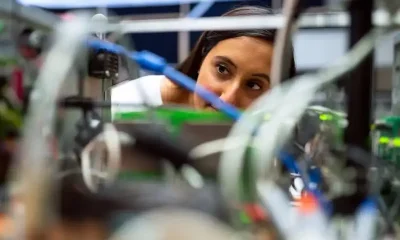Technology
Augury and Hightouch joined the unicorn club

Welcome to Startups Weekly — your weekly recap of everything you can’t miss from the world of startups. Want it in your inbox every Friday? Sign up here.
Startup life is a story of births and deaths. This week confirmed this, and it confirmed that unicorn rounds are not dead.
Most interesting startup stories from the week

As happens often in the startup world, it’s been a week of beginnings and endings.
Thinking machines: Thinking Machines Lab, the new AI startup of former OpenAI CTO Mira Murati, came out of stealth this week, without confirming how much it may have raised from VCs. Meanwhile, Ilya Sutskever’s startup Safe Superintelligence (SSI) is reportedly raising around $1 billion.
Humane killing: Humane, the hardware startup behind the flawed AI Pin, announced that most of its assets have been acquired by HP for $116 million.
Money back guarantee: San Francisco-based startup Future Family launched a new IVF insurance product in the United States that could refund prospective parents if treatment doesn’t succeed after two rounds.
Low battery: Former Silicon Valley darling Nikola Corp. filed for bankruptcy this week. The hydrogen electric trucking startup failed to find a buyer or secure additional funds to maintain operations.
Most interesting VC and funding news this week

We thought the days of counting unicorns were behind us, but not so much. Plus, legal AI is hot, and looming budget cuts inspired a new biotech venture fund.
Quadricorn: Austin-based defense startup Saronic raised a $600 million Series C to build an autonomous ship factory, also quadrupling its valuation to $4 billion from its last round.
New horn: Six months after raising a $150 million Series C at a $1.25 billion post-money valuation, AI coding startup Codeium is in talks to raise a new round led by Kleiner Perkins at a $2.85 billion valuation, sources told TechCrunch.
Joining the club: Hightouch, a startup co-founded by a former engineering manager at Segment that provides AI-powered marketing tools, closed an $80 million Series C round at a $1.2 billion valuation.
Augury, whose AI-based hardware detects malfunctions in factory machines, secured $75 million in equity funding as part of a Series F round that it is still closing. CEO and founder Saar Yoskovitz said this was an up-round valuing the startup at over $1 billion.
After the billion: After raising $1 billion to date since 2015, fintech Varo closed on $29 million out of the $55 million Series G it has been hoping to raise. Its CEO and founder, Colin Walsh, also recently announced he was stepping down.
Halfway: Sanas, which leverages AI to change call center workers’ accents in real time, closed a $65 million funding round, valuing the company at over $500 million.
Legal AI: AI-powered legal tech startup Luminance raised $75 million in a Series C funding round that follows several other deals closed by competitors, confirming the space is heating up.
New fund: Amid uncertainty on funding from the National Institutes of Health (NIH), Altitude Lab’s Pre-seed Venture Fund will consider investing $100,000 to $250,000 in biotech startups that were qualified for Small Business Innovation Research (SBIR) grants from the NIH.
Last but not least

Andreessen Horowitz may have $45 billion in assets under management, but Marc Andreessen isn’t “chomping at the bit to take the firm public.” Speaking on this week’s Invest Like the Best podcast, a16z’s co-founder discussed his goal of building it into an enduring company.
Source link
rewrite this title Augury and Hightouch joined the unicorn club
[gpt3]rewrite this content and keep HTML tags
Welcome to Startups Weekly — your weekly recap of everything you can’t miss from the world of startups. Want it in your inbox every Friday? Sign up here.
Startup life is a story of births and deaths. This week confirmed this, and it confirmed that unicorn rounds are not dead.
Most interesting startup stories from the week

As happens often in the startup world, it’s been a week of beginnings and endings.
Thinking machines: Thinking Machines Lab, the new AI startup of former OpenAI CTO Mira Murati, came out of stealth this week, without confirming how much it may have raised from VCs. Meanwhile, Ilya Sutskever’s startup Safe Superintelligence (SSI) is reportedly raising around $1 billion.
Humane killing: Humane, the hardware startup behind the flawed AI Pin, announced that most of its assets have been acquired by HP for $116 million.
Money back guarantee: San Francisco-based startup Future Family launched a new IVF insurance product in the United States that could refund prospective parents if treatment doesn’t succeed after two rounds.
Low battery: Former Silicon Valley darling Nikola Corp. filed for bankruptcy this week. The hydrogen electric trucking startup failed to find a buyer or secure additional funds to maintain operations.
Most interesting VC and funding news this week

We thought the days of counting unicorns were behind us, but not so much. Plus, legal AI is hot, and looming budget cuts inspired a new biotech venture fund.
Quadricorn: Austin-based defense startup Saronic raised a $600 million Series C to build an autonomous ship factory, also quadrupling its valuation to $4 billion from its last round.
New horn: Six months after raising a $150 million Series C at a $1.25 billion post-money valuation, AI coding startup Codeium is in talks to raise a new round led by Kleiner Perkins at a $2.85 billion valuation, sources told TechCrunch.
Joining the club: Hightouch, a startup co-founded by a former engineering manager at Segment that provides AI-powered marketing tools, closed an $80 million Series C round at a $1.2 billion valuation.
Augury, whose AI-based hardware detects malfunctions in factory machines, secured $75 million in equity funding as part of a Series F round that it is still closing. CEO and founder Saar Yoskovitz said this was an up-round valuing the startup at over $1 billion.
After the billion: After raising $1 billion to date since 2015, fintech Varo closed on $29 million out of the $55 million Series G it has been hoping to raise. Its CEO and founder, Colin Walsh, also recently announced he was stepping down.
Halfway: Sanas, which leverages AI to change call center workers’ accents in real time, closed a $65 million funding round, valuing the company at over $500 million.
Legal AI: AI-powered legal tech startup Luminance raised $75 million in a Series C funding round that follows several other deals closed by competitors, confirming the space is heating up.
New fund: Amid uncertainty on funding from the National Institutes of Health (NIH), Altitude Lab’s Pre-seed Venture Fund will consider investing $100,000 to $250,000 in biotech startups that were qualified for Small Business Innovation Research (SBIR) grants from the NIH.
Last but not least

Andreessen Horowitz may have $45 billion in assets under management, but Marc Andreessen isn’t “chomping at the bit to take the firm public.” Speaking on this week’s Invest Like the Best podcast, a16z’s co-founder discussed his goal of building it into an enduring company.
[/gpt
Technology
Did xAI lie about Grok 3’s benchmarks?

Debates over AI benchmarks — and how they’re reported by AI labs — are spilling out into public view.
This week, an OpenAI employee accused Elon Musk’s AI company, xAI, of publishing misleading benchmark results for its latest AI model, Grok 3. One of the co-founders of xAI, Igor Babushkin, insisted that the company was in the right.
The truth lies somewhere in between.
In a post on xAI’s blog, the company published a graph showing Grok 3’s performance on AIME 2025, a collection of challenging math questions from a recent invitational mathematics exam. Some experts have questioned AIME’s validity as an AI benchmark. Nevertheless, AIME 2025 and older versions of the test are commonly used to probe a model’s math ability.
xAI’s graph showed two variants of Grok 3, Grok 3 Reasoning Beta and Grok 3 mini Reasoning, beating OpenAI’s best-performing available model, o3-mini-high, on AIME 2025. But OpenAI employees on X were quick to point out that xAI’s graph didn’t include o3-mini-high’s AIME 2025 score at “cons@64.”
What is cons@64, you might ask? Well, it’s short for “consensus@64,” and it basically gives a model 64 tries to answer each problem in a benchmark and takes the answers generated most frequently as the final answers. As you can imagine, cons@64 tends to boost models’ benchmark scores quite a bit, and omitting it from a graph might make it appear as though one model surpasses another when in reality, that’s isn’t the case.
Grok 3 Reasoning Beta and Grok 3 mini Reasoning’s scores for AIME 2025 at “@1” — meaning the first score the models got on the benchmark — fall below o3-mini-high’s score. Grok 3 Reasoning Beta also trails ever-so-slightly behind OpenAI’s o1 model set to “medium” computing. Yet xAI is advertising Grok 3 as the “world’s smartest AI.”
Babushkin argued on X that OpenAI has published similarly misleading benchmark charts in the past — albeit charts comparing the performance of its own models. A more neutral party in the debate put together a more “accurate” graph showing nearly every model’s performance at cons@64:
Hilarious how some people see my plot as attack on OpenAI and others as attack on Grok while in reality it’s DeepSeek propaganda
(I actually believe Grok looks good there, and openAI’s TTC chicanery behind o3-mini-*high*-pass@”””1″”” deserves more scrutiny.) https://t.co/dJqlJpcJh8 pic.twitter.com/3WH8FOUfic— Teortaxes▶️ (DeepSeek 推特🐋铁粉 2023 – ∞) (@teortaxesTex) February 20, 2025
But as AI researcher Nathan Lambert pointed out in a post, perhaps the most important metric remains a mystery: the computational (and monetary) cost it took for each model to achieve its best score. That just goes to show how little most AI benchmarks communicate about models’ limitations — and their strengths.
Technology
The pain of discontinued items, and the thrill of finding them online

We’ve all been there. A favorite item is suddenly unavailable for purchase. Couldn’t the manufacturer have given you advance warning?
Whether owing to low sales, changing habits, production costs, or even because something is a little wrong with your favorite product (shh), discontinued items are part of life. In a weekend piece, the New York Times delves into the not-so-dark underbelly of online places where shoppers find these items, share tips and yes, find emotional support.
The story highlights a padded laptop bag made by Filson that a super fan now hunts “down everywhere” to snag as many as possible “before everyone figures out how great they are.” It points to Discontinued Beauty, a site whose offerings are old to visitors but new to the site. Among its latest products: an “essential protein restructurizer” by Redkin priced at an eye-popping $169.95. (The newest version of the product costs shoppers $32.)
Could it be dangerous to use these discontinued products? Who cares, suggests one creative director, who tells the Times about a lip pencil the beauty company NARS no longer sells and she has found elsewhere. “Now, do I know the proper way to store this for optimal conditions? No,” she says. “They’re under my sink.”
Technology
US AI Safety Institute could face big cuts

The National Institute of Standards and Technology could fire as many as 500 staffers, according to multiple reports — cuts that further threaten a fledgling AI safety organization.
Axios reported this week that the US AI Safety Institute (AISI) and Chips for America, both part of NIST, would be “gutted” by layoffs targeting probationary employees (who are typically in their first year or two on the job). And Bloomberg said some of those employees had already been given verbal notice of upcoming terminations.
Even before the latest layoff reports, AISI’s future was looking uncertain. The institute, which is supposed to study risks and develop standards around AI development, was created last year as part of then-President Joe Biden’s executive order on AI safety. President Donald Trump repealed that order on his first day back in office, and AISI’s director departed earlier in February.
Fortune spoke to a number of AI safety and policy organizations who all criticized the reported layoffs.
“These cuts, if confirmed, would severely impact the government’s capacity to research and address critical AI safety concerns at a time when such expertise is more vital than ever,” said Jason Green-Lowe, executive director of the Center for AI Policy.
-

 Technology8 months ago
Technology8 months agoTop 10 Technologically Advanced Countries and Their Products
-

 Technology7 months ago
Technology7 months agoWBTC (Wrapped Bitcoin)
-

 Technology8 months ago
Technology8 months agoDogecoin (DOGE) Cryptocurrency
-

 Technology9 months ago
Technology9 months agoTop 10 Trending Laptops Of 2024
-

 Technology7 months ago
Technology7 months agoEverything To Know About Litecoin As A Cryptocurrency
-

 Technology7 months ago
Technology7 months agoBKK:BCH Coin
-

 Technology8 months ago
Technology8 months agoCardano (ADA) Coin, Everything To Know
-

 Technology7 months ago
Technology7 months agoTron (TRX) Coin
